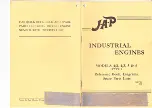
5
Do not use gasoline left over from the previous season,
to minimize gum deposits in your fuel system and to
ensure easy starting.
Do not add oil to the gasoline. Do not overfill the fuel
tank. Leave room for the fuel to expand.
Fuel Type
For best results use only clean, fresh, unleaded
gasoline with the pump sticker octane rating of 87 or
higher. In countries using the Research method, it
should be 90 octane minimum.
Unleaded gasoline is recommended as it leaves less
combustion chamber deposits. Leaded gasoline may
be used in areas where unleaded is not available and
exhaust emissions are not regulated. Be aware
however, that the cylinder heads may require more
frequent service.
Gasoline/Alcohol blends
Gasohol (up to 10% ethyl alcohol, 90% unleaded
gasoline by volume) is approved as a fuel for Kohler
engines. Other gasoline/alcohol blends are not
approved.
Gasoline/Ether blends
Methyl Tertiary Butyl Ether (MTBE) and unleaded
gasoline blends (up to a maximum of 15% MTBE by
volume) are approved as a fuel for Kohler engines.
Other gasoline/ether blends are not approved.
Coolant Recommendations
Use equal parts of ethylene glycol (anti-freeze) and
water only. Distilled or deionized water is
recommended, especially in areas where the water
contains a high mineral content. Propylene glycol
based anti-freeze is not recommended.
This mixture will provide protection from -37°C (-34°F)
to 108°C (226°F). For protection and use outside the
indicated temperature limits, follow the anti-freeze
manufacturers instructions on the container, but do not
exceed 70% anti-freeze.
DO NOT use anti-freeze with stop-leak additive(s), or
put any other additives in the cooling system.
Engine Identification Numbers
When ordering parts, or in any communication
involving an engine, always give the Model,
Specification, and Serial Numbers of the engine.
The engine identification numbers appear on a decal
affixed to the engine blower housing. Include letter
suffixes, if there are any.
Figure 4. Engine Identification Label.
The Emission Compliance Period referred to on the
Emission Control or Air Index label indicates the
number of operating hours for which the engine has
been shown to meet Federal and CARB emission
requirements. The following table provides the Engine
Compliance Period (in hours) associated with the
category descriptor found on the certification label.
Emission Compliance Period (Hours)
Refer to certification label for engine displacement.
Exhaust Emission Control System for models LV625,
LV675, and LV680 is EM.
Model Designation
Model LV625 for example: L designates liquid cooled,
V designates vertical crankshaft, and 625 is the model
designation. A letter suffix designates a specific
version as follows:
Suffix
Designates
S
Electric Start
Record your engine identification numbers on the
identification label (Figure 4) for future reference.
IMPORTANT ENGINE INFORMATION
THIS ENGINE MEETS U.S. EPA AND CA 2005
AND LATER AND EC STAGE II (SN:4) EMISSION
REGS FOR SI SMALL OFF–ROAD ENGINES
KOHLER CO. KOHLER, WISCONSIN USA
EMISSION COMPLIANCE PERIOD:
EPA:
CARB:
CERTIFIED ON:
REFER TO OWNER'S MANUAL FOR HP RATING,
SAFETY, MAINTENANCE AND ADJUSTMENTS
FAMILY
TYPE APP
DISPL. (CC)
MODEL NO.
SPEC. NO.
SERIAL NO.
BUILD DATE
OEM PROD. NO.
1-800-544-2444 www.kohlerengines.com
N11236
EPA
CARB
Category C
250 Hours
Moderate
125 Hours
Category B
500 Hours
Intermediate
250 Hours
Category A
1000 Hours
Extended
500 Hours






































